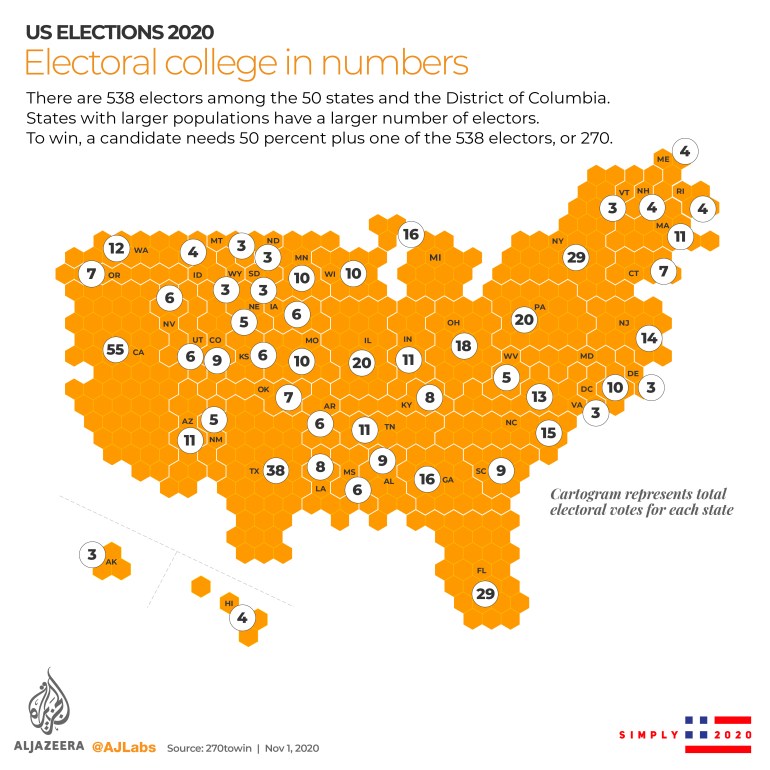After Joe Biden wins US presidential election, what happens next?
While Joe Biden is the United States’ president-elect, there are several key dates on his road to the White House.

Former Vice President Joe Biden on Saturday, November 7 passed the 270 vote electoral college threshold needed to claim victory in the 2020 presidential election, making him president-elect of the United States and Senator Kamala Harris vice president-elect.
But there are still several steps in the electoral process before President Donald Trump’s presidency ends on January 20 and Biden takes office.
Keep reading
list of 4 itemsTrump ally Rudy Giuliani files for bankruptcy following defamation case
‘Insurrection’ should bar Donald Trump from US presidency, lawyers argue
Ex-Proud Boys leader Joseph Biggs sentenced to 17 years for US Capitol riot
Here are the key dates leading up Biden becoming the 46th president of the US.
December 8
News organisations typically project who has won the election shortly after polls close on Election Day.
This year, those projections took several days, largely due to an unprecedented number of mail-in ballots cast amid the coronavirus epidemic in the country. At this point, news organisations, using a variety of factors, determine that one candidate no longer has a path to victory.
Trump has not conceded in the US presidential election, and his campaign has vowed to challenge the result.
However, official counting continues for several days, and sometimes weeks, after a winner is projected.
Under federal law, states must give an official vote count “as soon as practicable”. These tallies are subject to legal challenges and recounts, the criteria and timeline of which are regulated under individual states’ laws.
Trump has not conceded and his campaign has vowed to challenge the election results in certain states.
Some states, like Pennsylvania, automatically trigger a recount if the race is close. In Pennsylvania, that’s anything under a 0.5 percent margin between candidates. In others, like Wisconsin, where the Trump campaign has said it will seek a recount, it must be triggered by a request from a candidate.
Regardless of a state’s laws regarding recounts, state officials must meet the deadline – this year, December 8 – to appoint the electors who will decide the winner based on a certified final count. If they meet that so-called “safe harbour” deadline, Congress is required to accept those electors.
States are strongly incentivised to meet this standard.
While uncommon and based on individual state law, instances can emerge where recounts and legal disputes persist beyond the “safe harbor” deadline, which can lead to a swath of complex scenarios that include state officials and legislatures appointing rival slates of electors. In such an incident, Congress makes the final determination on which electors will be accepted.
December 14
There are 538 electoral votes, and the number of votes in each state matches how many US senators and representatives that state has in Congress. Washington, DC also has three electoral votes. In most states, all electoral votes are given to the candidate who wins the most votes in that state, although this is not necessarily required by law.
Two states – Maine and Nebraska – have slightly different systems: Two electors vote for the candidate that wins the state’s overall popular vote, while a third elector votes based on which candidate wins the most Congressional districts in that state.
Currently, 33 states and Washington, DC, have laws that require electors to vote for the candidate that wins the popular vote in their state.
While it is a norm, in states without laws requiring it, for electors to vote for the winner of the popular vote in the state, so-called “faithless electors” have in the past voted for a different candidate or declined to vote. Such an occurrence is relatively rare and has never decided a presidential contest.
On December 14, electors across the country cast their votes by paper ballots in their respective states and the District of Columbia, which has three electoral votes. Those results must be delivered to the US capital and other relevant officials by December 23.
January 6
The House and Senate hold a joint session to count the votes sent by electors across the country.
If one ticket has received 270 or more electoral votes, the president of the Senate, currently Vice President Mike Pence, will announce the winner of the election.

Members of Congress may also object to electoral returns from any state as they are announced. The objections must be made in writing by at least one member of the House and one in the Senate.
If the objection meets certain requirements, each chamber meets separately to debate the objection. After that, each chamber votes to accept or reject the objection. Any objection to a state’s electoral vote has to be approved by both chambers for the contested votes to be excluded.
If neither presidential candidate wins at least 270 electoral votes, the House decides the election, based on the 12th Amendment to the Constitution. If required, the House would elect the president through a majority vote.
January 20
President-elect Joe Biden will be sworn into office at noon on Inauguration Day. Vice-president elect Kamala Harris will be sworn in shortly before that.
